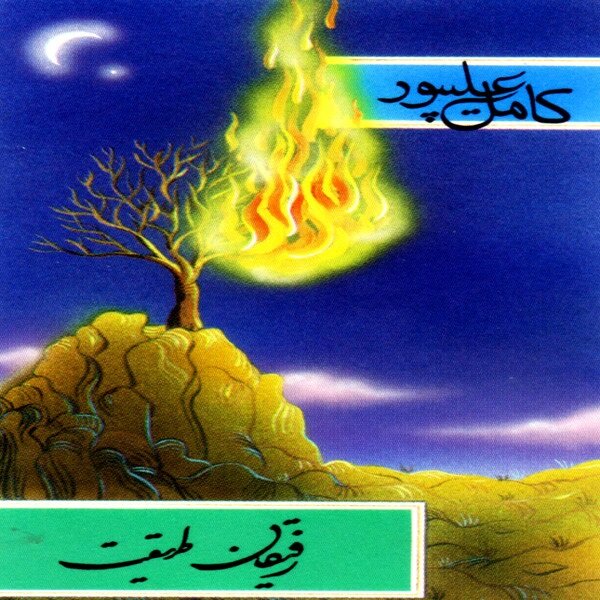Ustad KamEl Alipour
The traditional sounds of Persia come to life on the album composed, arranged and performed by Kamel Alipour entitled "Moon Dance". Classical Persian music is an ancient art form who's integrity and character must be preserved by those who have lived and breathed its essence for a great number of years; Kamel Alipour is one such musician. He displays remarkable skill and versatility on both Tar (a six stringed instrument with a sheep skin sound board, two resonance chambers and 27 moveable frets) and Setar (a three stringed instrument with a wooden sound board and a single resonance chamber). The deft touch of Kamel Alipour results in a beautiful music that is not only logical and technical, but highly emotional and spiritual as well; it is a delight to experience.
Classical Persian music is an ancient art form. Its roots can be traced back to the flourishing cultural germination that took place under the Parthian (349 B.C. - 226 A.D.) and Sassanid (226-651 A.D.) dynasties. This music is organized into seven scales and modes, called Dastgahs with five smaller sub-sets to these scales, called Aavaz. Each of these scales require specific emotional considerations exemplified by special melodic patterns called Gushes (pronounced goosheh). Spontaneous emotive improvisation is at the heart of this art form but must adhere to the paths governed by the Gushes. At first this may sound constricting for the musician yet there are approximately 250 different Gushes distributed among the seven Dastgahs, creating a myriad of possibilities. Presently, the integrity and character of this precious and antiquitous music must be preserved by those who have lived and breathed its essence for a great number of years; a time requirement that encompasses most of their lives. Kamel Alipour is such a musician.
He began studying the Tar at the Tehran Academy of Music, under the guidance of Ustad (master) Ali-Akbar Shahnaazi. Later he attended Tehran University, where he expanded his knowledge of Persian classical music theory, while studying Setar, Daf, and traditional singing techniques. He plays all the instruments found on this album, with the exception of the Tombak (Zarb). He also has composed and arranged all of the music in this recording.
Kamel Alipour shows adept versatility on, both, Tar and Setar, creating beautiful solo improvisations, some of which took as much time to record as it takes you to listen. His music is technical as well as logical and emotional as well as spiritual. In short "a mere pleasure".
Songs of the Enchanted
In 1994 Kamel wrote the album “Songs of the Enchanted” (آوای شیفتگان) for Parinaz. He played all the instruments in this album besides Tombak. He also sang two of the songs; “Mozhdeh Bedeh” and “Ghohar-e Vasl” in this album.
In the song Chal Ashigh, Kamel Alipour on Setar accompanied Mr. Yaghoub Zoroofchi singing this epic song. A must hear! (Circa 1995)
Kamel Alipour the Tar Maestro with Strunz and Farah.
For similar performances look for Axiom of Choice's "Beyond Denial" album and also Yussi & Django's "Bandidos De Amor" both albums on X DOT 25 Music Label (Circa 1994)
Songs:
Sufi: https://www.youtube.com/watch?v=XaVh9jij_WE
Kashghar: https://www.youtube.com/watch?v=kHz9dxEasKg
Shaharzad: https://www.youtube.com/watch?v=TqoSrY7Kn84
Dance of Djinn: https://www.youtube.com/watch?v=atctNTN-rQQ
Snakes of Azhidahak: https://www.youtube.com/watch?v=XakAeuUoxis
Desert Storm: https://www.youtube.com/watch?v=zLlgW5KTHZY
In 1993 Kamel wrote the epic Darvishan album with the voice of one of the most prominent Persian female vocalists Homayra.
Album Details:
Moon Dance (Raghs-e Mahtaab)
Style/Genre: World/Persian/Traditional/Instrumental
Instrumentation: Tar, Persian Setar, Kamancheh, Daf, Tombak.
The traditional sounds of Persia come to life on this album, composed, arranged, and performed by Kamel Alipour entitled "Moon Dance". Classical Persian music is an ancient art form whose integrity and character must be preserved by those who have lived and breathed its essence for a great number of years; Kamel Alipour is one such musician.
He displays remarkable skill and versatility on both Tar (a six stringed instrument with a sheep skin sound board, two resonance chambers and 27 moveable frets) and Setar (a three stringed instrument with a wooden sound board and a single resonance chamber). The deft touch of Kamel Alipour results in a beautiful music that is not only logical and technical, but highly emotional and spiritual as well; it is a delight to experience.
Tracks:
Songs (Time) Dastgah/Scale
1- Jaan-E Man (5:10) Homayoon
2- Mozhdeh Bedeh (7:23) Esfahan
3- Aavaa-ye Sheeftegaan (7:29) Mahoor
4- Zaar Baraam (7:03) Afshari
5- Jor-i-ye Jaam (7:34) Esfahan
6- Heech Magoo (7:15) Afshari
7- Aayeneh-Ye Koochack (6:32) Bayat-e Turk
8- Bahaaneh (9:54) Dashti
9- Gowhar-e Vassl (7:50) Mahoor
10- Lotf-E Yaar (6:44) Shoor
Total Time: 73:10
Item # CD 2004-2
All songs composed and arranged by: Kamel Alipour
All instruments played by: Kamel Alipour, except for Dunbak, by: Siamak Pouian
Sound engineered and mixed by: Yousef Shahab, at 42nd Studio, Hollywood, California
Cover concept, art direction, photography, computer manipulations and graphics: Koorosh Angali
Photo Model/Dancer: Shahrzad Khorsandi
Computer Graphics Support: Jayce Farahmand
Producer: Aldoush Alpanian
Executive Producers: X Dot 25 Music Productions
Kamel Alipour
Persian Instrumental Music based on the Sufi tradition of Jalal Odeen Rumi, nourished by the mystical sounds of Tar, Setar, Kamancheh, Daf and Tombak. This music will take you to a spiritual journey in the realm of enlightenment. Classical Persian music is an ancient art form. Its roots can be traced back to the flourishing cultural germination that took place under the Parthian (349 B.C. - 226 A.D.) and Sassanid (226-651 A.D.) dynasties. This music is organized into seven scales and modes, called Dastgahs with five smaller sub-sets to these scales, called Aavaz. Each of these scales require specific emotional considerations exemplified by special melodic patterns called Gushes (pronounced goosheh). Spontaneous emotive improvisation is at the heart of this art form but must adhere to the paths governed by the Gushes. At first this may sound constricting for the musician yet there are approximately 250 different Gushes distributed among the seven Dastgahs, creating a myriad of possibilities. Presently, the integrity and character of this precious and antiquitous music must be preserved by those who have lived and breathed its essence for a great number of years; a time requirement that encompasses most of their lives. Kamel Alipour is such a musician.
He began studying the Tar at the Tehran Academy of Music, under the guidance of Ustad (master) Ali-Akbar Shahnazi. Later he attended Tehran University, where he expanded his knowledge of Persian classical music theory, while studying Setar, Daf, and traditional singing techniques. He plays all the instruments found on this album, with the exception of the Zarb. He also has composed and arranged all of the music in this recording.
Kamel Alipour shows adept versatility on, both, Tar and Setar, creating beautiful solo improvisations, some of which took as much time to record as it takes you to listen. His music is technical as well as logical and emotional as well as spiritual. In short "a mere pleasure".
Instruments:
TAR: A six (three double) stringed instrument made of a rare kind of mulberry wood with thin lamb skin stretched over twin resonating chamber. SETAR: Actually means three stringed, however, it has evolved into an instrument containing two doubled pairs and a single resonator string for a total of five strings DAF: A large, tambourin-shaped drum, with goat skin, stretched over its circumference and a deep, bassy resonance.
Warning: All rights reserved. Unauthorized duplication is a violation of applicable law.
Nowruz (Norooz) Resideh
Nowruz (Norooz) Resideh 9:55
Music by: Kamel Alipour
Vocals by: Mahasti, Gloria Rohani, Shahla Sarshar, Shayesteh Zelli
Words by: Homa Mirafshar
© 1995 X DOT 25 Music
This epic song was written and produced by Kamel Alipour with the vocals of several prominent Persian Artists and well known Persian Vocalists: Mahasti, Gloria Rohani, Shahla Sarshar, Shayesteh Zelli. The lyrics, written by Homa Mirafshar, are about the tradition of the Persian New Year Ritual Nowruz (Norooz) with Spring inspirations. Persian New Year, which celebrated all over the world happens on March 21 (first day of Spring).
Style/Genre: World Contemporary
Instrumentation: Vocals, Tar, Persian Setar, Kamancheh, Daf, Tombak, Percussion.
نوروز رسیدهست
بیایید بیایید، گلِ عشق دمیدهست
بیایید بیایید، که نوروز رسیدهست
ای هموطن، عیدِ من و تو جوشِ بهار است
وقتی که درختان همه گلپوشِ بهار است
ساقی پسِ پردهست، به مستی و فلک مست
ذراتِ طبیعت همه مینوشِ بهار است
ساقی پسِ پردهست، به مستی و فلک مست
ذراتِ طبیعت همه مینوشِ بهار است
سنبل زِ سرِ شوق به تن جامه دریدهست
نوروز رسیدهست
نوروز رسیدهست
چون ابرِ بهاران زِ سرِ کوه برآمد
نرگس به غزلخوانی با تاجِ زر آمد
آن رختِ کهن را فلک انداخت به یکسو
آن رختِ کهن را فلک انداخت به یکسو
با جامۀ زنگاریِ دیبا به در آمد
با جامۀ زنگاریِ دیبا به در آمد
در دامنۀ کوهِ دماوند گلِ لاله دمیده
در دامنۀ کوهِ دماوند گلِ لاله دمیده
نوروز رسیده
نوروز رسیده
این مخملِ چشمانِ بنفشهست به صحرا
این رقصِ شکوفهست به صد رنگِ فریبا
این مخملِ چشمانِ بنفشهست به صحرا
این رقصِ شکوفهست به صد رنگِ فریبا
گویی که شده پاره گلوبندِ طبیعت
شاید به زمین ریخته از عقدِ ثریا
گویی که شده پاره گلوبندِ طبیعت
شاید به زمین ریخته از عقدِ ثریا
مشاطه بر ابروی فلک وصله کشیدهست
مشاطه بر ابروی فلک وصله کشیدهست
نوروز رسیدهست
نوروز رسیدهست
بیارید بیارید، پس سنتِ دیرین
گل و شمع بیارید سرِ سفرۀ هفتسین
بیارید بیارید، پس سنتِ دیرین
گل و شمع بیارید سرِ سفرۀ هفتسین
آن سوزنیِ ترمه و آیینه و سنبل
آن ماهیِ قرمز بهدلِ جام بلورین
آن سیب و سماق و سمنو، سرکه و سنجد
آن سیب و سماق و سمنو، سرکه و سنجد
آن سبزه و سیر است در آن سینیِ زرین
کس چون من و تو سفرهای از عشق نچیدهست
کس چون من و تو سفرهای از عشق نچیدهست
نوروز رسیدهست
نوروز رسیدهست
ببوسید در این عید همه چهره ی هم را
ببوسید در این عید همه چهره ی هم را
به بیگانه نمانید
به بیگانه نمانید که جزخویش ندارید
عشقست که بر قفل فروبسته کلید است
عشقست که بر قفل فروبسته کلید است
هما میرافشار



















